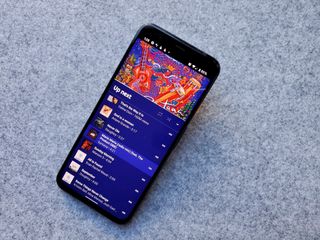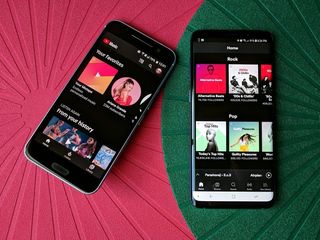YouTube Music's biggest problem is it's the green bubble to Spotify's iMessage

I've been critical of YouTube Music since it launched. There are still gaps and shortcomings that are inexcusable considering Google's resources, but it's come a long way in the last year and feature for feature it's not that far behind the competition. But of all the issues with YouTube Music, the biggest hurdle I keep coming up against is a social one — everyone I know uses Spotify, and that's a massive barrier to one of the biggest parts of music: sharing.
YouTube Music vs. Spotify: Which is the better streaming music service?
Sending a YouTube Music link is often both the start and end of that conversation.
Sending someone a YouTube Music link instead of Spotify is the music equivalent of being a green bubble on iMessage. Everyone uses YouTube, but practically nobody uses YouTube Music — it's an entirely foreign experience, to the point where most people don't even know it exists. And much like sending a message in a lesser-used chat app, sending a YouTube Music link is often both the start and end of that conversation.
If I want to talk to someone about music, share favorite tracks, or collaborate on a playlist, at this point I just preemptively go to Spotify's free web player, search for the song or album, and share that — even though it's available on YouTube Music and that's where I'm listening. And in return, I end up listening to a lot of Spotify too; it is, after all, the only music links anyone's sending my way.

Seeing a deluge of social media posts with everyone's Spotify 2019 year in review this past week is just another example of the power of the network effect. Sure it seems silly, and yeah all of the same music is available on YouTube Music, but once again you're missing out on the social, communal and cultural involvement portion of the music experience. I can read everyone's Spotify year-in-review, but I don't get to share my own or join that conversation in the same way; and if I did, nobody would care ... they aren't going to follow my YouTube Music link anyway.
The interesting thing here is that Apple Music hasn't created the same massive draw and user lock-in as iMessage, despite Apple's heavy push for it on its own platform and its availability on Android. Spotify has managed to be the music streaming service of choice on all platforms. Although its market share may not be at monopoly levels, and its features may not be outlandishly ahead, that doesn't matter — with music nowadays, it's about the social network around the music service that matters as much as the service itself.
Unlike iMessage lock-in, Spotify has robust cross-platform support.
According to research from Midia, Spotify is far and away the most-popular music streaming service with 36% of the market, a whopping 108 million subscribers. Apple in second with 18%, and Amazon in third under 13%, don't combine to be as big as Spotify — despite having massive advantages in the ability to bundle and deeply discount their subscriptions. Google has gained since launching YouTube Music, but is still at just 5% — and I imagine a solid chunk of that is coming from promotional rates from buying Google hardware and services, plus its "free" bundling with YouTube Premium.
Be an expert in 5 minutes
Get the latest news from Android Central, your trusted companion in the world of Android
Thankfully for all of us on Android, unlike Apple's annoying iMessage lock-in we can all use Spotify on whatever platform we'd like. Spotify is incredibly versatile, not only with having good apps for both Android and iOS but also for desktop operating systems, the web, wearables and smart speakers. And at the same time, there's no inherent advantage to using YouTube Music over Spotify on Android — and Spotify is definitely ahead with third-party service and hardware integrations.
This is the classic chicken-and-the-egg problem; but it's not your problem to solve by using YouTube Music.
Of course this is the classic chicken-and-the-egg network effect problem: nobody uses YouTube Music, so the fear of leaving that Spotify social network value keeps people from trying it to grow the user base in the first place. But much as I wrote about regarding using RCS for your only chat app, this doesn't have to be your hill to die on. If sharing your music with friends and family is important to you, you should go to the music service that enables that. Statistically, that's probably Spotify.
I feel I have the ability to be critical of YouTube Music both because Google has generally failed to make a compelling product, and because I use it every single day. But the only reason I use YouTube Music at this point is because I'm frugal; Music is included in my YouTube Premium subscription, which I happily pay for just to remove ads from YouTube. If I'm going to be paying for YouTube Premium, it seems silly to spend another $120 per year on Spotify — but I'm close to doing just that.
If Google didn't have this wonderful pricing bundle available, I would have zero reason to use YouTube Music. It is a worse overall product than Spotify, from its apps to its weak (or nonexistent) integration with other services and hardware. And increasingly importantly for me, YouTube Music simply acts as a barrier to sharing music with my friends; that isn't something I should have to give up.
Andrew was an Executive Editor, U.S. at Android Central between 2012 and 2020.

